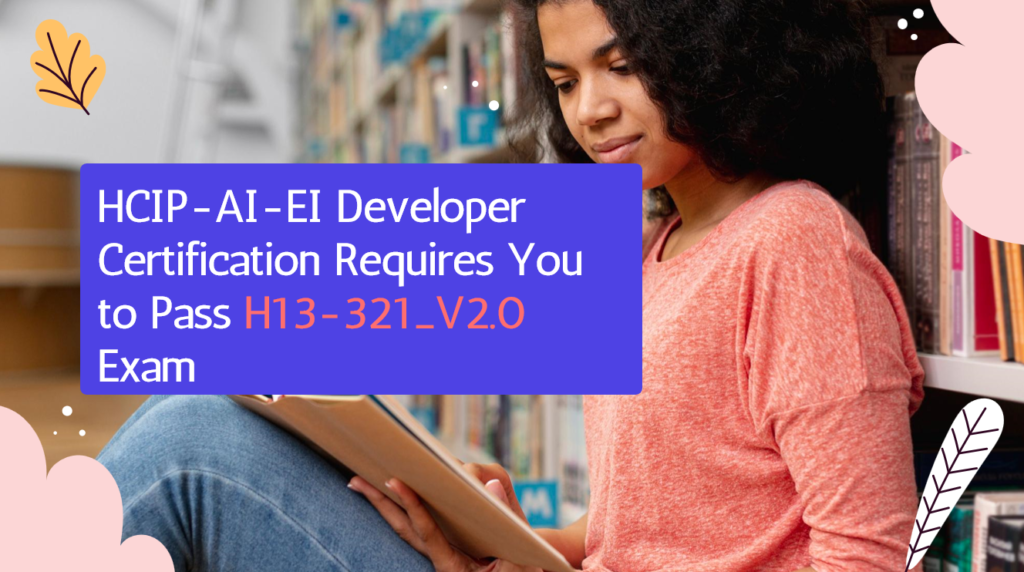HCIP-AI-EI Developer Certification Requires You to Pass H13-321_V2.0 Exam
Huawei’s HCIP-AI-EI Developer V2.0 certification provides a pathway for individuals aiming to develop advanced AI skills, especially in image, speech, and natural language processing. This certification is ideal for those who want to pursue a career as AI engineers or specialists in these areas. To achieve this HCIP-AI-EI Developer certification, candidates must pass the H13-321_V2.0 exam. The HCIP-AI-EI Developer V2.0 certification focuses on equipping AI developers with the essential knowledge and skills to design, develop, and deploy AI solutions using popular tools such as Python, TensorFlow, and Huawei ModelArts. Upon completing this certification, individuals demonstrate their ability to work with cutting-edge AI technologies in various fields such as image processing, speech processing, and natural language processing (NLP).

Key Competencies Gained
By obtaining the HCIP-AI-EI Developer V2.0 certification, professionals demonstrate their competence in:
1. Mastering the Fundamentals of AI: This includes understanding the core principles behind neural networks, AI architecture, and machine learning frameworks.
2. Image Processing: Candidates are equipped with the skills to develop and deploy AI models for image processing, understanding key concepts such as computer vision, feature extraction, and image classification.
3. Speech Processing: This certification prepares individuals to work on AI models for speech recognition, transforming raw audio data into actionable insights or commands.
4. Natural Language Processing (NLP): The certification ensures candidates are proficient in developing NLP models that enable machines to understand, process, and generate human language.
5. AI Development Tools: Learners gain hands-on experience using industry-standard tools like Python, TensorFlow, and Huawei ModelArts, Huawei’s AI development platform. This combination of tools enables candidates to develop robust and scalable AI applications.
6. Practical AI Development Skills: The certification also emphasizes the practical application of AI technologies through hands-on lab guides focused on image processing, speech processing, NLP, and ModelArts.
Target Audience
This certification is ideal for:
– AI enthusiasts looking to break into the field.
– Developers and engineers who want to specialize in AI technologies.
– AI professionals aiming to expand their knowledge in image, speech, and NLP technologies.
– Individuals seeking senior roles as image processing engineers, speech recognition engineers, and NLP engineers.
Exam Prerequisites
Before attempting the H13-321_V2.0 exam, candidates are expected to have a solid foundation in Java and Python programming languages. While formal experience in AI is not required, it is highly recommended that candidates complete the HCIA-AI certification as a preparatory step. HCIA-AI provides an introductory understanding of AI technologies, which lays the groundwork for the more advanced topics covered in the HCIP-AI-EI Developer V2.0 exam.
H13-321_V2.0 Exam Overview
The H13-321_V2.0 exam is the gateway to achieving the HCIP-AI-EI Developer V2.0 certification. Below is a breakdown of the exam structure and key details:
– Exam Type: Written examination
– Question Types: Single-answer questions, multiple-answer questions, true or false, short response items, drag-and-drop items
– Duration: 90 minutes
– Passing Score: 600 out of 1000
– Exam Fee: 300 USD
– Languages Available: Chinese, English
H13-321_V2.0 Exam Content
The H13-321_V2.0 exam covers a wide range of topics, ensuring candidates have both theoretical knowledge and practical skills in AI. Key areas include:
– Neural Network Basics: Understanding the structure and functionality of neural networks, which form the basis of AI models.
– Image Processing: Learning about image classification, object detection, and other essential image processing tasks.
– Speech Processing: Developing models for speech recognition, synthesis, and understanding.
– Natural Language Processing (NLP): Exploring the core concepts of NLP, including tokenization, sentiment analysis, and text generation.
– Huawei AI Ecosystem: An overview of Huawei’s AI Development Strategy and its full-stack, all-scenario AI portfolio, including the ModelArts platform.
– Practical Lab Guides: In-depth guides on using ModelArts for real-world AI model development, including labs on image processing, speech processing, NLP, and more.
The HCIP-AI-EI Developer V2.0 certification is an excellent credential for anyone looking to advance their career in AI development. It offers both the theoretical knowledge and practical skills necessary to succeed in roles focused on image processing, speech recognition, and natural language processing. By passing the H13-321_V2.0 exam, candidates can demonstrate their ability to work with AI development tools and contribute meaningfully to AI projects in various industries. With the growing demand for AI talent globally, obtaining this certification not only enhances your professional credibility but also opens doors to exciting and innovative job opportunities in the field of AI.
